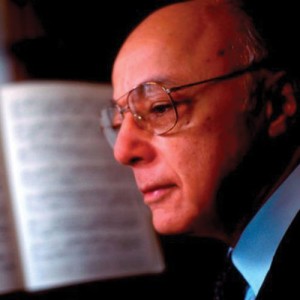
American pianist and teacher Seymour Lipkin passed away on Monday. He was 88.
Born in Detroit, Lipkin studied with Rudolf Serkin, Mieczyslaw Horszowski, and David Saperton. During the Second World War, while still a student at Curtis, he accompanied Jascha Heifetz in concerts for American troops stationed around the world. In 1948 Lipkin won the Rachmaninov Competition, launching a significant solo career. He was a longtime faculty member of both the Juilliard School and the Curtis Institute of Music. In his youth, he studied conducting with Serge Koussevitzky at Tanglewood and George Szell as an apprentice at the Cleveland Orchestra.
Interviews suggest that Seymour Lipkin was the model of a well-rounded artist. As a teenager he was inspired by the music from Wagner’s Ring Cycle. (He would later serve as Curtis’ opera pianist). For students, he stressed the importance of listening to a variety of music and developing your own interpretation.
Seymour Lipkin was regarded as one of the finest interpreters of the music of Beethoven. In 2004 he released the complete cycle of Beethoven’s piano sonatas on the Newport Classics label. Unlike many artists, he was intimately involved in the editing of his recordings, with the goal of capturing the spontaneity and cohesiveness of a live performance. Here, he plays the stormy first movement of Beethoven’s “Pathétique” Sonata:
In contrast to the opening movement, the second movement of the “Pathétique” moves to a serene new world:
Here is the Rondo:
[unordered_list style=”tick”]
- Find Seymour Lipkin’s recordings at iTunes, Amazon.
- A fascinating interview from this past July from Final Note Magazine: A Life in Music: Seymour Lipkin
[/unordered_list]


 Today is the 100th birthday of twentieth century English composer Benjamin Britten (1913-1976). Let’s celebrate by listening to Britten’s Four Sea Interludes from the opera, Peter Grimes. Played during scene changes, these interludes express the drama of the opera’s unsettling story. As you listen, consider the mood that Britten evokes and pay attention to the orchestration. You can read the synopsis of the entire opera
Today is the 100th birthday of twentieth century English composer Benjamin Britten (1913-1976). Let’s celebrate by listening to Britten’s Four Sea Interludes from the opera, Peter Grimes. Played during scene changes, these interludes express the drama of the opera’s unsettling story. As you listen, consider the mood that Britten evokes and pay attention to the orchestration. You can read the synopsis of the entire opera